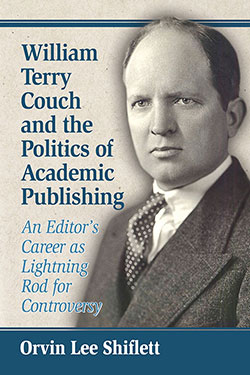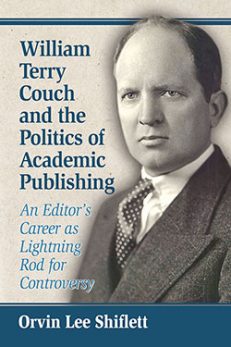William Terry Couch and the Politics of Academic Publishing
An Editor’s Career as Lightning Rod for Controversy
$29.95
In stock
About the Book
William Terry Couch (1901–1988) began his four-decade publishing career building the University of North Carolina Press into one of the nation’s leading university presses. His editorial attacks on the social ills of the South earned him a reputation as a southern liberal. By the 1940s, his disaffection with New Deal politics turned him toward the right, resulting in his 1950 firing as director of the University of Chicago Press.
As a conservative, Couch sought books and articles that would sway general readers from what he saw as an intellectual torpor that accepted the growing role of government in American life. The liberals who controlled the presses found him dogmatic and irascible. When he tried to turn Collier’s Encyclopedia into a journal of conservative opinion, he was fired as editor in chief in 1959. He ended his career as publisher for the libertarian William Volker Fund, which collapsed in the 1960s under charges of Nazism.
Couch was committed to publishing as a social cause and strove to disturb American complacency. This is the first book-length biography of Couch—a publisher who brought academic scholarship to the reading public to effect social, political and economic change.
About the Author(s)
Bibliographic Details
Orvin Lee Shiflett
Format: softcover (6 x 9)
Pages: 276
Bibliographic Info: notes, bibliography, index
Copyright Date: 2015
pISBN: 978-0-7864-9981-6
eISBN: 978-1-4766-2241-5
Imprint: McFarland
Table of Contents
Acknowledgments vi
Introduction 1
1. A University Press in the South 7
2. Culture in the South 39
3. Books That Ought to Be Written 63
4. A Case History in Book Publishing 87
5. Objectivity and Social Science 117
6. The Sainted Book Burners 145
7. Do Intellectuals Have Minds? 164
8. The Human Potential for Modernism 193
9. The Word and the Rope 215
Chapter Notes 231
Bibliography 251
Index 260





